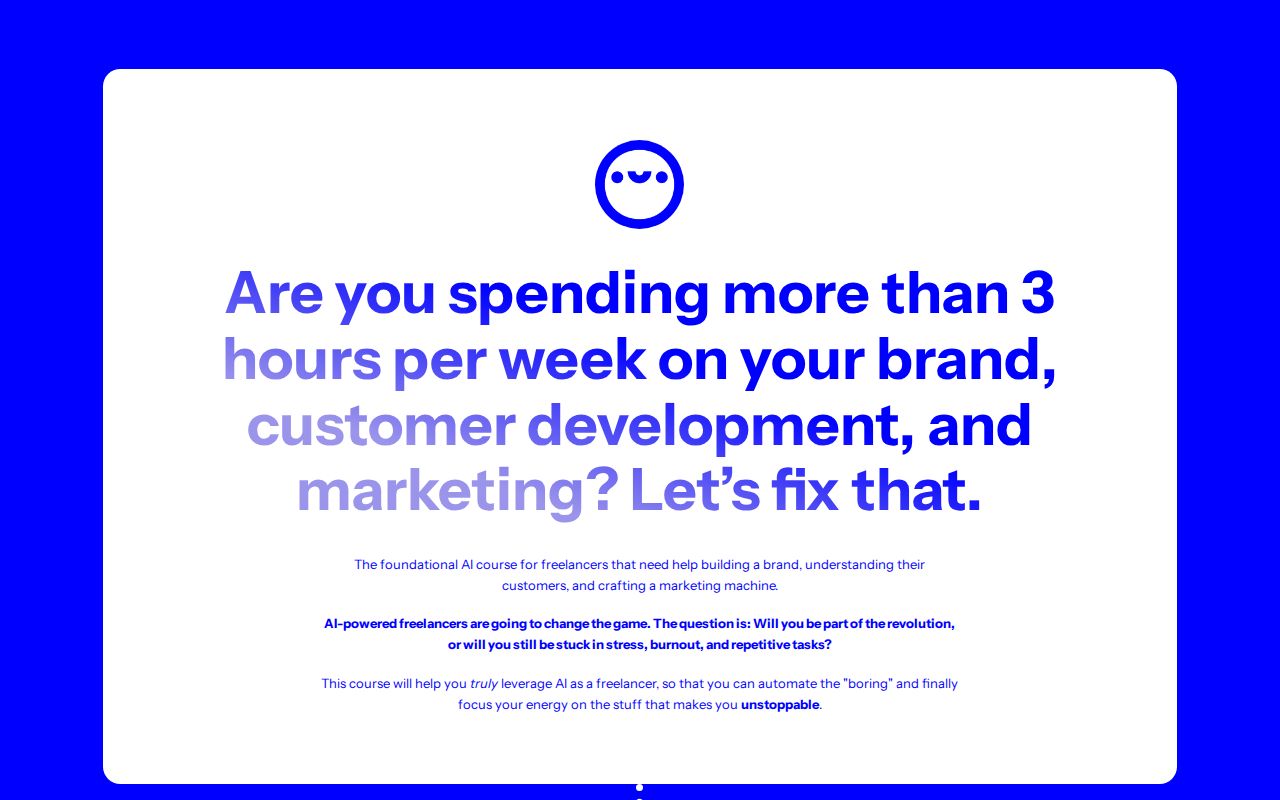“Freelancer” is a word that comes with baggage. It makes you small. Replaceable. A cog in someone else’s machine.
CEOs? They don’t think small. They don’t wait for orders. CEOs build. They lead. They define the game instead of just playing it.
It’s time to stop being just another freelancer. Start thinking—and acting—like a CEO. Here’s how to make the shift.
Ask bigger questions
Freelancers love briefs. A neat little checklist of what the client wants. But the real gold isn’t in the brief—it’s in the questions no one’s asking.
CEOs don’t wait for instructions. They dig deeper. They ask, “What’s really at stake here?” and “What problem are we actually solving?”
👉 Here’s what this looks like:A client asks you to design a website. Most freelancers would say, “Sure. What’s the color palette?” A CEO-level thinker asks, “Why now? What’s the goal? Is the website the answer, or is it part of something bigger?”
Suddenly, you’re not just a designer. You’re a strategist. You’re someone who cares about the outcome, not just the output. And clients? They pay a premium for that.
Stop paddling. Steer the boat.
Freelancers paddle faster. CEOs pick the right river.
It’s not about working more hours, answering more emails, or saying yes to every project. It’s about steering the ship. Deciding where to go and what matters most.
👉 How to think like a CEO:
Look at everything you’re doing.
Ask: “What’s moving me toward my vision, and what’s just keeping me busy?”
Cut the fluff. Double down on the big stuff.
👉 Use this framework:
Urgent and important: Do it now.
Important but not urgent: Schedule it.
Urgent but not important: Delegate it.
Neither: Delete it.
Every time you say no to something small, you say yes to something big.
Sell the mountain, not the climb.
Nobody cares how many steps it’ll take to climb the mountain. They care about the view from the top.
Freelancers sell the steps: the logo, the wireframe, the copy. CEOs sell the view: the brand that gets noticed, the website that converts, the story that sticks.
👉 Here’s how to flip your pitch:Instead of saying, “I’ll create your website,” say, “I’ll create an online presence that turns visitors into customers.” Instead of offering “social media content,” promise “a strategy that makes your audience trust you.”
The difference is subtle but game-changing. People don’t hire you for what you do. They hire you for what you can help them become.
Own everything.
Freelancers deliver. CEOs own.
If a project goes off the rails, a freelancer says, “That’s not my job.” A CEO says, “Let’s fix this.” Ownership isn’t about blame—it’s about responsibility. It’s about seeing the whole picture and making sure it works.
👉 Here’s what ownership looks like:Your client’s team misses deadlines? You adjust the plan and keep things moving. The brief is vague? You ask for clarity. You’re not just a piece of the puzzle—you’re the person making sure the puzzle gets finished.
Ownership builds trust. Trust builds loyalty. And loyalty? That’s how you get clients who come back, over and over again.
Build a machine.
Freelancers wing it. CEOs build systems.
Systems let you work smarter, faster, and better. They turn chaos into clarity and give you the mental bandwidth to focus on what really matters.
👉 Steal these systems:
Client onboarding: Use a simple Notion or Google Form to gather everything upfront.
Project management: Tools like Trello or ClickUp keep you organized.
Invoicing: Automate it with Wave or FreshBooks. Or Odoo. Or InvoiceGenerator.
Start small. Every system you build is one less thing to worry about later. And there are TONS of systems out there, that other CEOs have already built. Leverage them. Don’t wing it. Don’t reinvent the wheel.
Think bigger, act bigger
“Freelancer” isn’t who you are. It’s just what you’ve been calling yourself. But the truth? You’ve been the CEO of your career all along. You just needed to own it.
When you think like a CEO, everything changes. You stop chasing clients and start attracting them. You stop following briefs and start leading projects. You stop trading time for money and start creating value.
Call yourself a CEO. Start acting like one.
The world’s waiting for you to lead.

